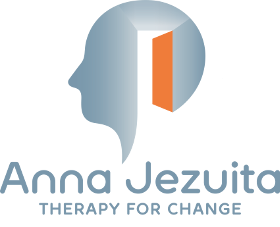Anna Jezuita:
English & Polish Speaking Therapist in London
Counselling (MBACP accred) and Therapy in Polish
I originally qualified as a Barrister in my native Poland, then changed career directions when I moved to the UK 18 years ago. I gained my postgraduate diploma in Therapeutic Counselling (Integrative) at the University of East London in 2003, complemented by a Diploma in Clinical Supervision in 2016.
I offer counselling and therapy in Polish and English, in my quiet, comfortable therapy rooms in Holborn, Central London, WC1 or Streatham South London SW16.
In my counselling career I have worked in a wide range of environments including family support services and drug rehabilitation programs in London prisons and in the community, whilst continuing to deliver lectures at Warsaw University – Psychology Department over the years.
Me as a therapist – who will you meet?
In my therapeutic work I relate to clients from a position of an ‘equal with expertise’ rather than an elevated expert. With my personal experience of living with addictions, divorce, changing countries and professions – not belonging, I strive to approach people from a position of somebody who is also still grappling with life, hence I feel I have compassion with my client’s struggles, rather than looking on as an expert with a ready made solution.
My barrister training allows me to see and relate to problems without attachment to one view. Mindfulness based approach combines logic with warm compassion, helping to re-frame clients’ view on a certain situation or thought, and create an instant shift and relief of client’s anxiety.
I am also a Mindfulness Teacher with a keen interest in running Mindfulness Workshops for anybody looking to find a more calm and measured relationship with life and its challenges.
I believe that mindfulness practice is a tool for maintaining psychological hygiene, “Mental flossing” if you like!
My Approach
What theoretical modalities do I use and why?
My approach is integrative, meaning it includes several theoretical approaches which in my view suit best my values and my views on human nature and development.
I believe that all human beings strive to be happy and to avoid suffering. We are all full of potential, already perfect, only a bit confused. On our ‘way to happiness’ we do the best we know at the time, to achieve that goal, but our lack of knowledge and resources often makes us clumsy, sometimes unkind.
The above beliefs attracted me to the humanistic view of human development and the Person Centred Approach and Existential Therapy, seeing people as intrinsically positive, striving for actualisation (‘happiness’).
The MBCT (Mindfulness Based Cognitive Therapy), part of CBT school, proposes that we can change the way we think or feel not by changing the content of our brain but by changing the relationship with our thoughts and emotions. This theoretical approach allows the clients to see that ‘you don’t have to believe in everything you think and feel’ and discover that by developing understanding and acceptance for our thoughts we are also gaining control and ability to choose whether to act upon them or not.
As MBCT meditation exercises became a part of my own practice, I could experience the effectiveness of this approach in my life. I learned to see myself with more distance and warm sense of humour, seeing my “dramas” as product of my disquieted mind. I discovered joy coming from the sense of freedom to choose who I want to be. I believe that I can help clients in their journey to a similar place.
My professional standards
How do I maintain my standards as a therapeutic counsellor, ethically and professionally?
I am an accredited member of BACP and my professional practice undergo annual reviews.
I subscribe to BACP code of Ethical Practice regarding client confidentiality and data protection.
I attend monthly supervision meetings with a colleague who is my equal or senior in terms of expertise and experience in order to reflect on my practice and professional development.
I am also a supervisor and hold the equivalent position in relation to my colleagues, which means that I am accountable not only for my practice but also for the quality of work and developments for the whole profession.
